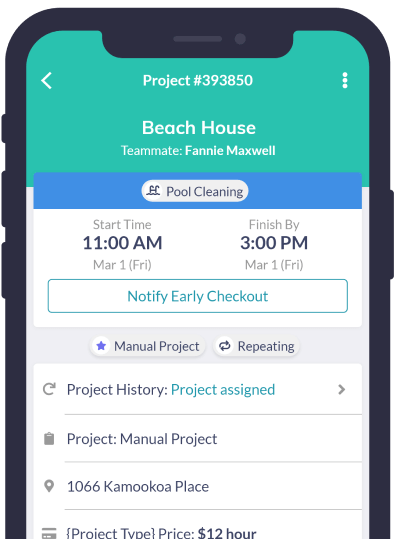What to Know Before Financing a Vacation Rental
Last year was a lucrative year for short-term rental property owners, particularly for those using online marketplaces like Airbnb and Vrbo. According to a recent report from AirDNA, 62% of short-term rental properties were occupied at any given time in 2021, up by 5% from 2020 and 10% from 2019.
This rise in demand meant landlords could charge higher rates for their vacation rental properties — earning an average of 39% more annually compared to pre-pandemic numbers.
There’s never been a better time to invest in a short-term rental property. But first, here are five key factors to consider when preparing to finance a vacation rental property.
1. Review Your Personal Finances With a Professional
Successfully managing a short-term rental property is no small feat — it requires financial literacy and preparation. Whether you’re new to real estate or not, it’s crucial that you seek guidance from a trusted mortgage advisor, financial planner, or CPA before making any decisions.
A financial professional can help you map out an accurate analysis of your finances and, most importantly, provide sound advice about what makes the most sense in the context of your unique financial situation. They might ask: What are your financial goals? Do you currently have any debt? Are you generating a budget surplus or deficit?
This conversation can give you more clarity about your current and future financial situation so you can perform an informed cost-benefit analysis of investing in a vacation rental property.

2. Explore Lenders and Loan Products That Align With Your Financial Needs
Once you have a clear understanding of your finances, you’re better positioned to shop around for loan products that address those unique needs. As Torri Shack, Head of Mortgage Solutions at Azibo, puts it, “The best thing you can do as an investor is to educate yourself on the different types of financing.” Why? “That way, when you get to the table, you will know what you’re talking about and what your options are.”
A good place to start is by considering a conventional lender, like traditional banks or credit unions. Your options will likely be consistent across these financial institutions, so this path offers a good baseline for seeing what’s out there.
Many hosts also choose this route because securing a mortgage loan from a traditional lending institution typically means lower interest rates and fees. That said, hosts should keep in mind that interest rates for investment properties are anywhere from .50% to .75% higher than the rate on their primary residence mortgage because real estate loans are considered “riskier.”
For the same reason, many rental property loans get rejected by banks. As a result, investors turn to alternative lending options, also known as “hard money lenders.” This typically refers to private, online lending companies.
Many of these loans have a different underwriting process, meaning they tend to provide funds at a faster rate but have vastly different requirements depending on the firm. For this reason, hosts need to be extremely cautious about who they trust with their finances.
Do your due diligence and be wary of predatory lenders — some alternative lenders are exploitative and overcharge on interest rates.
3. Identify Your Property Classification: Second Home vs Investment Property
It matters how you classify your short-term rental property. In fact, whether it’s a second home or an investment property largely affects financing options and loan qualification requirements.
Buyers with high credit scores and the ability to pay in cash may qualify to finance their vacation home as a second home. According to the National Association of Realtors, about one-third of investors and buyers pay in cash for their vacation home properties.
When a vacation rental property is classified as your second home, this indicates that you intend to live there for part of the year. The IRS offers a more detailed definition, describing a vacation rental property as a property you live in more than 14 days per year or 10% of the days you rent it out to others. In some cases, lenders may require you to live within a certain proximity of your rental property.
On the flip side, an investment property describes a property that has been purchased with the intent to earn rental income or sell for a profit in the future. Hosts typically go this route when they need rental income to afford the mortgage payment, or to qualify for a loan.
This usually comes with a larger down payment — around 20% — and higher interest rates because lenders see rental income as the main source of loan repayment. This is risky from their perspective, since providing projections about rental income can be difficult and inaccurate.
Nonetheless, lenders do require buyers to provide a lot of supplemental information when applying for a loan, including rental income projections and well-researched estimated vacancy and occupancy rates. This helps instill trust that the property will have a good return on investment.

4. Review Insurance Options and Costs
It doesn’t matter if you’re a seasoned rental property owner or a first-time investor — landlord insurance is absolutely essential.
The possibilities for property damage and injury only increase when multiple people are coming and going from your property during the year. In fact, insurance is generally 20% to 30% higher for short-term rentals than it is for long-term ones because the risks associated with damage are higher.
Beyond that, most mortgage providers require insurance in order for landlords to secure a loan. Even if you own your house outright (for example, if you purchased it in cash without a loan), it’s still a good idea to get landlord insurance and protect yourself against financial loss.
As you prepare to secure financing on a vacation rental property, be sure to shop around for insurance and understand how these costs factor into your budget and overall finances.
If you feel lost, dedicated agents from companies like Azibo can help you get quotes from the market’s most reputable carriers, analyze terms and pricing, and determine the option that works best for you — then work closely with you to adjust coverage and guide you through the purchasing process.
5. Keep Taxes and Maintenance Costs in Mind
Last but certainly not least, there are many other costs to keep in mind when financing a short-term property rental.
From taxes and utilities to repairs and maintenance, things add up quickly. It’s important to be aware of how curveballs like an unexpected leak or weather damage to your roof can set you back hundreds or even thousands of dollars.
In other words? Be prepared for the unexpected.







